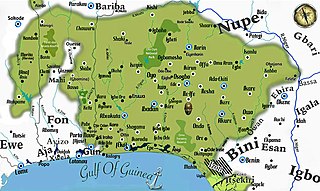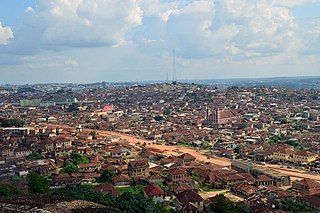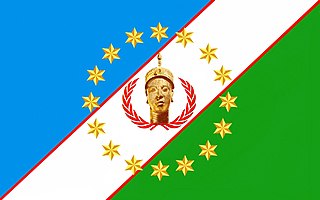
Orishas are spirits that play a key role in the Yoruba religion of West Africa and several religions of the African diaspora that derive from it, such as Cuban, Dominican and Puerto Rican Santería and Brazilian Candomblé. The preferred spelling varies depending on the language in question: òrìṣà is the spelling in the Yoruba language, orixá in Portuguese, and orisha, oricha, orichá or orixá in Spanish-speaking countries.

Yorubaland is the homeland and cultural region of the Yoruba people in West Africa. It spans the modern-day countries of Nigeria, Togo and Benin, and covers a total land area of 142,114 km2 or about 60% of the land area of Ghana. Of this land area, 106,016 km2 (74.6%) lies within Nigeria, 18.9% in Benin, and the remaining 6.5% is in Togo. Prior to European colonization, a portion of this area was known as Yoruba country. The geo-cultural space contains an estimated 55 million people, the majority of this population being ethnic Yorubas.
Ota is a town in Ogun State, Nigeria with an estimated 163,783 residents. Ota is the capital of the Ado–Odo/Ota Local Government Area. The traditional leader of Ota is the Olota of Ota, Oba Adeyemi AbdulKabir Obalanlege. Historically, Ota is the capital of the Awori Yoruba tribe.

Ogun State is a state in southwestern Nigeria. Created on 3 February 1976 from the former Western State. Ogun State borders Lagos State to the south, Oyo State and Osun State to the north, Ondo State to the east, and the Republic of Benin to the west. Abeokuta is both Ogun State's capital and most populous city; other important cities in the state include Ijebu Ode, the royal capital of the Ijebu Kingdom, and Sagamu, Nigeria's leading kola nut grower. Ogun state is covered predominantly by rain forest and has wooden savanna in the northwest. Ogun State had a total population of 3,751,140 residents as of 2006, making Ogun State the 16th most populated state in Nigeria In terms of landmass, Ogun State is the 24th largest State in Nigeria with land area of 16,762 kilometer square.

Ilaro is a town in Ogun State, Nigeria. Ilaro town houses about 57,850 people. Ilaro is the headquarters of the Yewa South Local government, now known as YEWALAND which replaced the Egbado division of the former Western State, and later became a part of Ogun State of Nigeria. Ilaro town is about 50 km from Abeokuta, the Ogun State capital, and about 100 km from Ikeja, the capital city of Lagos State.
The Ẹgbado, now Yewa, are a subgroup of the Yoruba people and inhabit the eastern area of Ogun West Senatorial District, Ogun State, in south-west Nigeria, Africa. In 1995 they changed their name to the Yewa which comes from the Yewa River which in turn comes from the Yoruba goddess Yewa. Your clan now comprises 4 local Governments Yewa South, Yewa North, Imeko-Afon, and Ipokia, while the Ado-Odo/Ota LGA forms the 5th Awori part of the senatorial district.
The Ado-Odo/Ota Local Government Area is one of the 19 Local Government Areas of Ogun State, Nigeria. It came into existence on May 19, 1989, following the merging of Ota, part of the defunct Ifo/Ota Local Government with Ado-Odo/Igbesa Areas of the Yewa South Local Government. Ado-Odo/Ota borders on metropolitan Lagos. The Local Government Area is the second largest in Ogun State and it is headquartered at Ota at6°41′00″N3°41′00″E to the north of the Area. Other towns and cities include Araromi-Alade, Ado-Odo, Agbara, Igbesa, Iju-Ota, Itele, Kooko Ebiye Town, Owode, Sango Ota etc.

Tope AlabiListen(born 27 October 1970) in Ogun, a Nigerian gospel singer, film music composer and actress. She is also known as Ore ti o common and as Agbo Jesu. Tope Alabi obtained a Higher National Diploma in Mass Communication from the polytechnic of Ibadan, after graduating in the year 1990, she worked as a correspondent at NTA in Ibadan. She started singing at the younger age, when she joined the choir in her local Catholic church at the age of seven. Tope has ability to produce different traditional and modern beats. She had composed and released several songs and couple with Christian slangs that made her different.

The Awori is a tribe of the Yoruba people speaking a distinct dialect of the Yoruba language.

The Yoruba people are a West African ethnic group who mainly inhabit parts of Nigeria, Benin, and Togo. The areas of these countries primarily inhabited by the Yoruba are often collectively referred to as Yorubaland. The Yoruba constitute more than 52 million people in Africa, are over a million outside the continent, and bear further representation among members of the African diaspora. The vast majority of the Yoruba population is today within the country of Nigeria, where they make up 21% of the country's population according to CIA estimations, making them one of the largest ethnic groups in Africa. Most Yoruba people speak the Yoruba language, which is the Niger-Congo language with the largest number of native or L1 speakers.

Toyin Omoyeni Falola is a Nigerian historian and professor of African Studies. Falola is a Fellow of the Historical Society of Nigeria and of the Nigerian Academy of Letters, and has served as the president of the African Studies Association. He is currently the Jacob and Frances Sanger Mossiker Chair in the Humanities at the University of Texas at Austin.

Imeko Afon is a Local Government Area in the west of Ogun State, Nigeria bordering the Republic of Benin. Its headquarters are in the town of Imeko at coordinates 7°29′00″N2°53′00″E.
Yewa South,, is a Local Government Area in the west of Ogun State, Nigeria bordering the Republic of Benin. Its headquarters are in the town of Ilaro at6°53′00″N3°01′00″E in the north of the Area.

Ado-Odo is the metropolitan headquarters of the kingdom of Ado, renowned for its Oduduwa/Obatala temple, the ancient fortress of the traditional practice of Ifá. Oodu'a is also regarded by traditionalists as the mother of all deities worldwide. All of these made Ado an inviolate territory in western Yorubaland—the same "father-figure" status accorded to Ile-Ife. Unlike the other kingdoms, which had at one time or the other engaged in the internecine wars that ravaged Yorubaland in the nineteenth century, Ado stood out as an unconquered sanctuary city-state throughout the period.
Egba Ake, otherwise known as Egba Alake, is one of the five sections of Egbaland, the others being Oke-Ona, Gbagura, the Owu and Ibara. It is a traditional state which joins with its bordering sections to form something of a high kingship. The Alake of Abeokuta, or Alake of Egbaland, is the traditional ruler of the Egba clan of Yoruba in the city of Abeokuta in southwestern Nigeria.
The Ibarapa are a Yoruba people group located in the Southwestern corner of Oyo State. The name of the group is derived from a local cultivar of the melon plant, known locally as Egusi Ibara, which was historically acknowledged by neighboring peoples such as the Egbas, Ibadans and Oyos to be extensively cultivated in the area.
Bọ̀lọ̀jọ̀ is an African dancing and popular musical style among the Yewa Yoruba clans situated in the western regions of Ogun State, Nigeria and other closely linked Yoruba subgroups in the nearby Plateau Department of Benin.

Ilara Yewa is a Nigerian town in the west of Ogun State, Nigeria about 91 kilometers northwest of Abeokuta. It lies on the border between Nigeria and Benin. Its elevation is 600 feet above sea level. Ilara Yewa is about 50 kilometres by road from Ketu, a major trading town in Benin. The second-largest settlement, Ilara, merges into Ilara.










